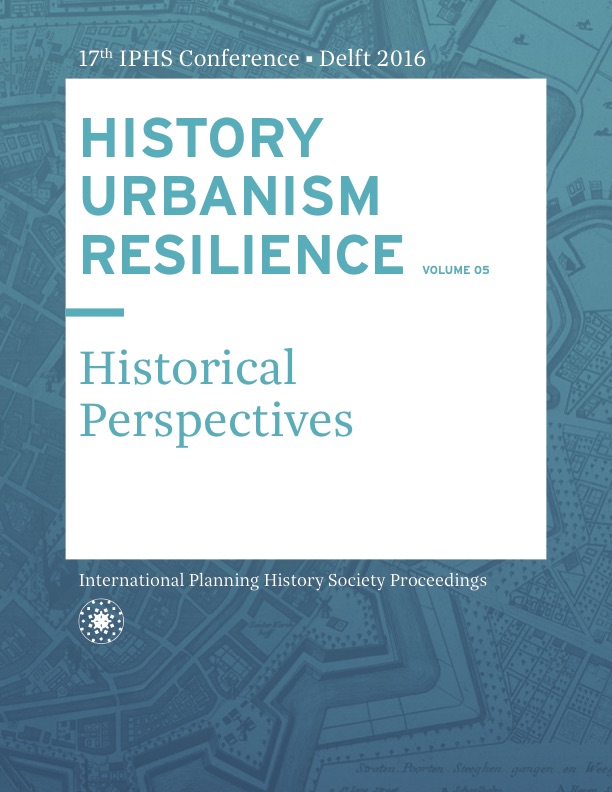Unlocking the Past to Re-enact Rotterdam’s future: A professional’s view on planning history.
DOI:
https://doi.org/10.7480/iphs.2016.5.1312Abstract
To implement policy, spatial planners depend on common narratives. That is true in Rotterdam too. But what sets a city like Rotterdam apart is that its history is influenced by dramatic and traumatic events. This history must therefore first be unlocked before we are able to design a successful future.The history of the last 140 years of port city of Rotterdam shows that, efforts were directed unilaterally on the port. This was due to the absence of a representative city. One consequence is that the city and the port are seen as two entities or stronger Rotterdam is mainly seen as a gateway. Today a new perspective for the port is badly needed, given the vulnerable position of a future without fossil fuels. That's why in 2013 the OECD argued that huge economic benefits could be achieved if the ports and cities worked together more effectively. However, to accept this challenging advice, the question is: “How can Rotterdam strip its historical grown lock-in, of the big port with a small city and look for a more synergetic future?’ Additionally the real potential of the social-economical interface of the port city region had not been explored..
The international Isocarp congress 2015 was an opportunity to re-enact Rotterdam’s future by bringing together experts from municipalities, port authorities and universities. . The idea was to research the impact of this international orientated port embedded in the local social-economic network or: “How to develop unprecedented port city synergy?”. It became clear that parallel histories of other port cities could be imaginaries for the future of Rotterdam. They show that a successful port can in fact boost an urban economy. However these histories can only shape the future by acting. Therefore the workshop was intended as a stepping-stone to re-enact the future. This paper will show that the synergy can only be successful when focussing on the Metropolitan region as a whole hosting the maritime and food cluster and knowledge and innovation hubs.
References
Aarts M.J. Leven in de stad. Rotterdam: Uitgeverij 010, 1987.
Aarts M.J. Vijftig jaar wederopbouw Rotterdam. Rotterdam: Uitgeverij 010, 1995.
Aarts, M.J , Maandag, B. Accelerating Rotterdam stad in versnelling. Rotterdam: IFHP 2000 wereldcongres “Urban Networks” 2000.
Aarts, Daamen, Huijs, de Vries, Port City development in Rotterdam: A true love story. http://urban-e.aq.upm.es/. Rotterdam, 2013.
Blijstra R. Rotterdam Stad in beweging. Amsterdam: N.V De Arbeiderspers, 1965.
Bout, van J, Pasveer, E. Kop van Zuid. Rotterdam: Uitgeverij 010 Publishers, 1994.
Hein, Carola. Port Cities: Dynamic Landscape and Global Networks. New York: Routledge, 2011.
Jacobs, Huijs, Rotterdam heeft spilfunctie in grondstoffenvoorziening in “Economische Verkenning Rotterdam”, pp 54 – 56. Rotterdam: Gemeente Rotterdam, 2015
Laar van de, P.T. Stad van formaat. Zwolle: Waanders, 2000.
Marlet. G. De aantrekkelijke stad. Nijmegen: VOC Uitgevers, 2009.
Moscoviter H. Op de groei gemaakt. Rotterdam: Gemeentewerken Rotterdam, 1996.
Moscoviter H. 100 jaar hoogbouw in Rotterdam, Zoiets Amerikaansch. ISBN 9080427020, 1999.
Pennebaker, J.W. Collective Memory of Political Events. Lawrence Erlbaum Associates, Publishers, 1997.
Rifkin, J. The third industrial revolution. U.S., Palgrave Macmillan, 2013.
Schrijer, van der Zwan Interview met Dominic Schrijer en Arie van der Zwan in “Rotterdam” (Wiardi Beckman Stichting), pp 219-228. Amsterdam: Mets & Schilt, 2004.
Schijf, H. Mercantile elites in the port of Amsterdam and Rotterdam, 1850-1940 in Hein C. (2011), Port Cities, pp 104 – 115. London and New York, Routledge, 2011.
Schubert, D. Seaport cities in Hein C. Port Cities, pp 54 - 69. London and New York: Routledge, 2011
Termeer, C.J.A.M., B. Kessener, Revitalizing stagnated policy processes: Using the configuration approach for Research and interventions. In: The Journal of Applied Behavioral Science, Vol. 43, No.2, pp.256 – 272, 2007.
Tillie N. Rotterdam-people make the inner city. Issued on the occasion of the 5th IABR. Rotterdam, 2012

